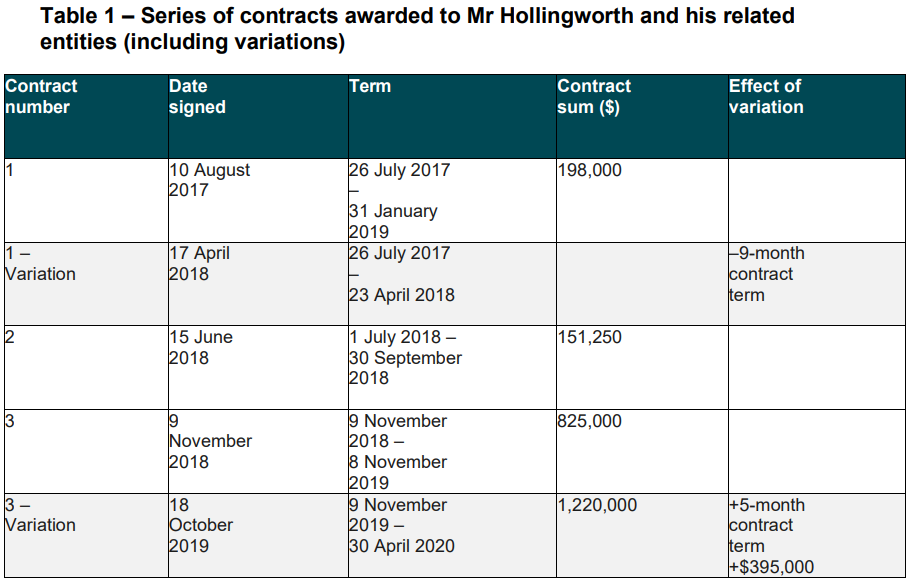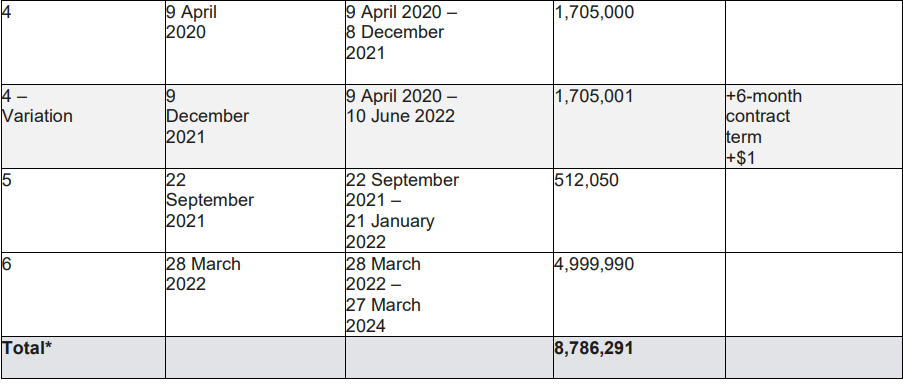
“Complexity and systems thinker” Patrick Hollingworth’s impenetrable language should have raised red flags. Photo: Celebrity Speakers.
The ACT Integrity Commission may have handed in its Special Report on the CIT contracts scandal, but there are still many unanswered questions, even after two years of investigation.
Apart from speculation about the former CEO Leanne Cover being out of her depth or inferences that can be drawn from the report about a belief she could not effect the CIT’s organisational change without Patrick Hollingworth’s services, we are no closer to understanding why she was so invested in such an obviously exorbitant procurement.
Particularly when she was warned off by Skills Minister Chris Steel’s former chief of staff in a half-hour telephone call after Mr Steel’s initial letter of concern in February 2021.
The report notes how potentially risky for a cash-strapped CIT the sixth and final contract worth $5 million was, especially when the payment schedule called for a third of the amount to be paid upfront.
Yet Ms Cover went ahead anyway, in defiance of the minister and without telling her own board.
As the report said understatedly, it was bound to cause public controversy were it to become known.
The fallout has been much more: CIT’s reputation is in tatters, more than one career has been destroyed, and the public purse is up for God knows how much of a bill after a two-year investigation that remains ongoing.
Opposition Leader Elizabeth Lee would like to add Mr Steel’s scalp to that list, but he is holding firm in his belief that he did what he could within the limitations of overseeing a statutory authority.
The fact is, he and the Board were blindsided.
Mr Steel said trust is at the centre of how these bodies operate – between the minister, the CEO and the board. It was Ms Cover who abrogated that obligation and threw the whole arrangement into disarray.
Still, Ms Lee won’t stop highlighting the fact that it was a long time between February 2021 and June 2022 when the issue broke in the media.


The six contracts with Mr Hollingworth. Image: Integrity Commission.
But there should have been red flags waving for the Board before an ABC-initiated freedom of information search triggered Mr Steel’s concerns.
Mr Hollingworth’s companies had been engaged for three years and four contracts worth more than $4 million to help drive the CIT change project.
The report says that from the start, there were concerns about the vagueness and pricing of Mr Hollingworth’s proposals, and the commission will be examining the early contracts and the procurement process in the next phase of its investigations.
Any analysis of the language deployed by the so-called “complexity and systems thinker” should have prompted scepticism from the Board.
It obviously did from staff who eventually went to the Opposition and media.
Tortured, opaque, indecipherable and jargonistic have been just some of the terms used to describe it.
This is from a September 2021 report co-penned by Ms Cover and Mr Hollingworth on the progress of the reform project, which it said had met entrenched resistance from staff and been let down by the government:
Elemental to CIT’s 2025 strategy is the institute’s ability to learn. A system that learns is a system that naturally cycles through front and back loops of the adaptive cycle. However, CIT has spent its entire existence in a slow front loop dynamic from growth to conservation and has been stuck in a rigidity trap for some time.
The structures and cyclic processes are deeply entrenched, and treatment, its ‘fixes’ of events changes nothing. Fear of messiness, uncertainty and loss of power and control has led to an avoidance of the necessary back loop.
However, cycling through the back loop is nothing to be feared: it is an inherently natural part of how systems maintain. The seeds of innovation and new opportunities and growth lie within the fragmentation and release of the back loop.
The global phase shift associated with the Covid-19 pandemic, along with the release of the Strategic Compass 2025, ACT Government’s cabinet reforms, and the new Woden campus, have aligned to create an unprecedented window of opportunity for CIT not only to continue its transformation efforts but to double down on them.
This language was echoed in the requirements for the sixth $5 million contract awarded in March 2022, about which Ms Cover kept the minister and the board in the dark.
The irony is that an organisation dedicated to training trades, where you would think plain speaking was the norm, should be at the mercy of such nonsense.

Former CIT CEO Leanne Cover’s actions remain a mystery. Photo: File.
The Hollingworth/Cover report blamed everybody but the contractor for the three years of work that had achieved very little.
But one telling passage highlighted by the commission points to a belief from the pair that the answer was to pour even more resources into the project:
“These additional elements of work have focused on two components, namely ethnography — which is the qualitative and quantitative study and mapping of cultures — and the design, field-testing and refinement of an approach which – if appropriately supported by the Board and adequately funded — gives CIT the only realistic option available to it for creating a sustainable, long-term future.”
How this was allowed to go on for so long, from the first contract in 2017 to the 2022 cancellation of the final one, is another key question.
The Hollingworth/Cover report was a self-serving exercise that the commission noted did not mention a fifth contract under consideration, and given both the former CEO and the consultant co-authored the report, raises questions about their working relationship.
A comment from former board chair Craig Sloan suggested that the pair did work closely together.
Mr Sloan was asked whether the issue of the FOI request that triggered Mr Steel’s concerns was discussed with Mr Hollingworth.
He responded that it had not, although “knowing everything I now know”, it would not have surprised him [if it had been discussed] given the relationship between Mr Hollingworth and Ms Cover, who had been aware of the potential reputational risk of media interest.
Obviously, CIT has been able to survive and perhaps even thrive without Mr Hollingworth, who is pursuing the remaining millions not paid to him from the sixth contract in the courts. But the cost has been enormous.
The affair has highlighted a range of issues with government procurement and public administration generally, and Mr Steel said actions in line with the Auditor-General’s recommendations have been taken to tighten requirements and ensure ministers are kept in the loop.
One can only hope that plain English might also be a requirement.
This is not the end of the matter, with the commission continuing its investigations and both the government and CIT looking to recover some of their costs. Who knows when the Integrity Commission’s next, and hopefully, final report will be completed?
But everyone will be looking to have these outstanding questions answered.



















